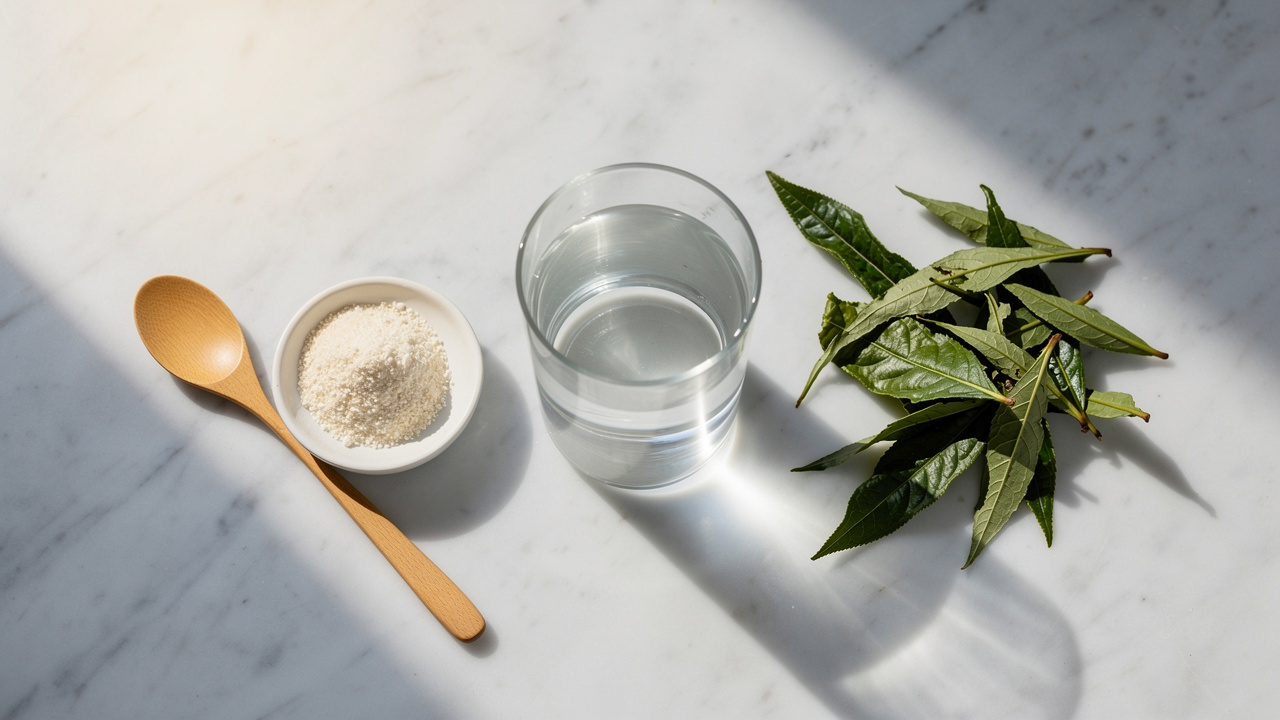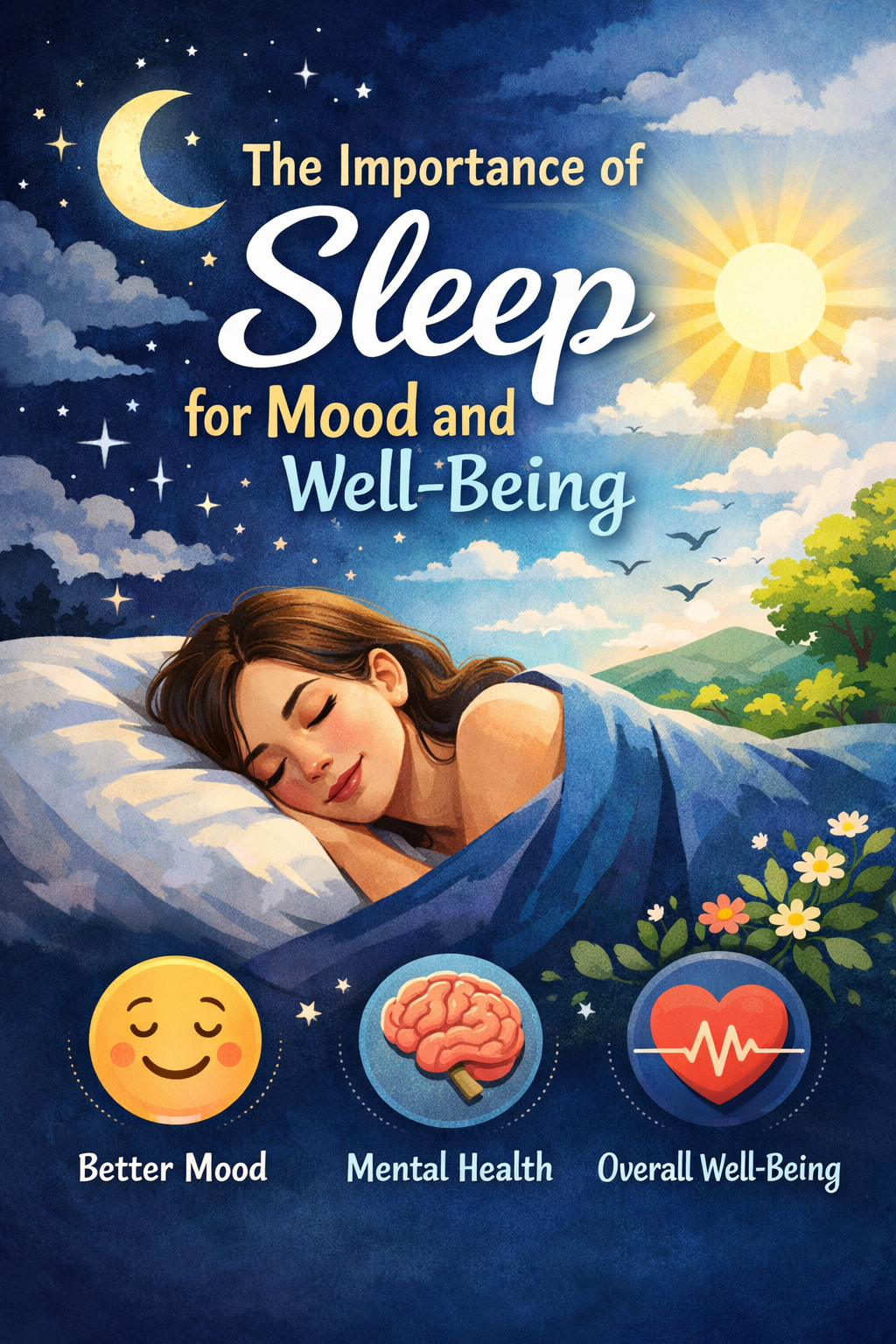Theanine For Sleep: How A Tea Amino Acid Can Help You Rest Naturally
Sleep rarely responds to force. It responds to conditions. For many people, L‑theanine — often just called theanine — is part of creating those conditions.
Theanine for sleep is appealing because it does not knock you out. Instead, it gently settles the nervous system, softens stress, and makes it easier to drift off and wake feeling more restored. This calm, clear relaxation is why it appears in SLP1 formulas such as Get To Sleep and Deeper Sleep.
This guide walks through what theanine is, how it works in your brain, what the research shows, and how to use theanine for sleep in a thoughtful, science‑based way.
“Sleep is the single most effective thing we can do to reset our brain and body health each day.” — Matthew Walker, PhD, author of Why We Sleep
What Is L‑Theanine And Where Does It Come From?

L‑theanine is a water‑soluble amino acid found mainly in the leaves of the tea plant Camellia sinensis and in a few mushroom species, where (PDF) L-Theanine: A Unique functional amino acid offers multiple health benefits and food applications. Unlike most amino acids, theanine is not used to build proteins. Its value lies in how it interacts with the brain and nervous system.
Key points about its origins:
-
Primary natural source: Green, black, white, and oolong teas
-
Typical content: Roughly 25–60 mg of theanine per cup, depending on tea type, brand, and steeping time
-
Taste: Contributes to the gentle savory, umami flavor that softens the bitterness of caffeine in tea
Because the amount in tea is variable, many people interested in theanine for sleep choose standardized supplements. Capsules, powders, and multi‑ingredient blends like Get To Sleep and Deeper Sleep provide a consistent dose and avoid late‑night caffeine.
After you take it, theanine is absorbed into the bloodstream and crosses the blood–brain barrier within about 30–60 minutes, where it can start influencing neurotransmitters and brain waves.
How Theanine For Sleep Works In Your Brain

Theanine helps you feel calm but clear, not sedated. It works through several connected pathways: calming excitatory signals, supporting relaxing neurotransmitters, and influencing brain waves and sleep‑related hormones.
Calming Overactive Excitatory Signals
Theanine’s structure resembles glutamate, the brain’s main excitatory neurotransmitter. Because of this similarity, theanine can bind to glutamate receptors and gently dampen some of glutamate’s stimulating effects.
This matters for sleep because:
-
Excess glutamate activity is linked with racing thoughts, anxiety, and difficulty winding down
-
By moderating glutamate signaling, theanine helps quiet the mental noise that keeps many people awake
Animal studies suggest theanine can also counter some of caffeine’s stimulatory impact on glutamate receptors. That helps explain why a cup of tea often feels smoother than the same amount of caffeine from coffee.
Supporting Relaxing And Mood‑Balancing Neurotransmitters
Theanine also shifts the balance of other key neurotransmitters involved in sleep and mood:
|
Neurotransmitter |
Main Role |
How Theanine Appears To Influence It |
|---|---|---|
|
GABA |
Primary calming neurotransmitter |
May raise levels and support receptor activity |
|
Serotonin |
Mood, calm, sleep‑wake regulation |
May increase brain serotonin |
|
Dopamine |
Motivation, reward, emotional balance |
May raise dopamine in specific brain regions |
|
Norepinephrine |
“Fight‑or‑flight” arousal and alertness |
Tends to reduce excessive norepinephrine |
By supporting GABA, serotonin, and dopamine, theanine encourages a quieter, more settled nervous system without the heavy sedation seen with many sleep medications.
If you enjoy the deeper biochemistry, SLP1’s overview of the science behind their ingredients discusses how these pathways fit together.
Shaping Brain Waves And Sleep Hormones
Electroencephalogram (EEG) studies show that standard doses of 50–200 mg of theanine increase alpha brain waves — the pattern linked with relaxed, wakeful states such as meditation or the moments just before sleep. People often experience this as “calm but alert,” not groggy.
When theanine is used regularly, sometimes alongside magnesium, research suggests:
-
Increased delta brain wave activity, associated with deep, restorative non‑REM sleep
-
Improved function of receptors involved in GABA and serotonin signaling
-
Increases in melatonin, the hormone that coordinates the sleep–wake cycle
Together, these effects help explain why many people notice that theanine for sleep makes it easier to drift off, stay asleep, and feel more refreshed — even though it does not act as a blunt sedative.
What The Research Says About Theanine For Sleep
Human trials on theanine and sleep are growing. The picture is nuanced: people usually feel they sleep better, even when sleep‑tracking devices show modest changes.
Subjective Sleep Quality: How People Feel

A large review and meta‑analysis that combined 19 randomized controlled trials (almost 900 participants) found that theanine supplementation:
-
Improved self‑rated sleep quality
-
Shortened perceived time to fall asleep
-
Reduced daytime tiredness and impairment
In individual trials, around 200 mg of theanine in the evening helped adults with mild sleep complaints report:
-
Easier sleep onset
-
Better satisfaction with their sleep
-
Less daytime fatigue and “brain fog”
This mirrors what many users of Get To Sleep and similar formulas describe: not always dramatically longer sleep, but deeper, more satisfying rest.
Objective Sleep Measures: What Devices See
When researchers track sleep using polysomnography (sleep lab studies) or actigraphy (wearable devices), they often see:
-
Little consistent change in total sleep time
-
Minimal change in sleep efficiency (time asleep vs. time in bed)
-
Mixed results on objective time to fall asleep
This gap between how sleep feels and what devices show is common. With theanine for sleep, the main strength seems to be reducing pre‑sleep stress and improving the experience of sleep, rather than dramatically reshaping sleep stages.
Populations That May Benefit Most
Most trials involve healthy adults, but small studies point to benefits of theanine for sleep in certain groups:
-
Adults with major depressive disorder and other mood conditions
-
Adults with schizophrenia, who frequently have marked sleep disruption
-
Boys with ADHD, where 400 mg/day of theanine improved sleep efficiency and reduced nighttime restlessness
Many of these studies use multi‑ingredient formulas, and the research is still developing. The consistent pattern: theanine for sleep appears most helpful when stress, anxiety, and a restless mind are driving poor rest.
For a broader, whole‑plan approach to rebuilding sleep — especially for parents — SLP1 explores these concepts in Reclaim Your Sleep: The SLP1 Protocol for Moms to Win Their Sleep Back.
How Theanine For Sleep Compares To Other Natural Sleep Aids
Theanine is rarely used alone. It often appears alongside other natural sleep supports such as glycine, reishi mushroom, and melatonin, each with its own strengths.
Theanine And Glycine
Glycine is another amino acid with solid research behind it. As discussed in Glycine for Sleep: A Comprehensive Guide:
-
Glycine helps lower core body temperature, a natural cue for sleep
-
It can deepen slow‑wave sleep and reduce next‑day sleepiness
While theanine for sleep mainly settles the mind and stress chemistry, glycine works more on the body’s physical readiness for rest. Many comprehensive formulas — including Deeper Sleep — combine both to address mental and physical barriers to sleep.
Theanine And Reishi Mushroom
Reishi mushroom is a traditional calming herb. Modern research suggests that, over several weeks, it may:
-
Reduce stress and mild anxiety
-
Improve reported sleep quality
SLP1 discusses this further in Explore the Sleep‑Supporting Powers of Reishi Mushroom. Theanine and reishi act on related but different pathways: theanine shifts neurotransmitters quickly, whereas reishi’s effects tend to build gradually with consistent use. For people wanting a gentle, long‑term approach, pairing theanine for sleep with reishi can be reasonable.
Theanine And Melatonin
Melatonin is the hormone your brain makes to signal that night has arrived. As a supplement, it is especially useful for:
-
Jet lag
-
Shift work
-
Circadian rhythm disorders (when your internal clock is out of sync)
Theanine and melatonin differ in important ways:
-
Theanine: Calms the nervous system and quiets mental overactivity
-
Melatonin: Nudges the timing of your internal clock
For someone lying awake from late‑night stress, theanine for sleep may make more sense than extra melatonin. For someone who naturally falls asleep at 3 a.m., a small dose of melatonin plus theanine might help more than either one alone.
How To Use Theanine For Sleep: Dosage, Timing, And Combinations

Using theanine for sleep works best when you match dose and timing to your needs and think carefully about combinations.
Recommended Dosage Ranges
There is no single official dose, but clinical trials offer useful guideposts:
-
Relaxation and stress support: 200–400 mg per day, often split into two doses
-
Sleep support: About 200 mg taken in the evening is most commonly studied
-
Overall study range: 50–1000 mg per day, generally well‑tolerated
Practical tips:
-
Start on the lower end (100–200 mg in the evening) to see how you respond
-
Increase gradually if needed, staying within research ranges
-
If you use a multi‑ingredient product like Deeper Sleep or Get To Sleep, follow the label instructions instead of stacking extra theanine unless a clinician advises you to
Always check with a healthcare professional if you have medical conditions or take medications.
Tea Versus Supplements
You can obtain theanine for sleep from tea, but there are trade‑offs.
Tea as a source:
-
Roughly 25–60 mg of theanine per cup
-
Also contains caffeine unless it is decaffeinated
-
Theanine content varies widely by tea type, brand, and brewing method
To reach the 200 mg dose used in many studies, you might need 4–8 cups of tea, which can mean:
-
Too much caffeine for sensitive people
-
More nighttime bathroom trips
-
Difficulty controlling the exact dose
Supplements offer more precise dosing and avoid evening caffeine. If you love the ritual of tea, decaffeinated green tea or a theanine‑fortified herbal blend can pair nicely with a capsule of theanine for sleep.
Working With GABA, Magnesium, And Caffeine
GABA
Animal studies show that combining theanine with GABA helps animals fall asleep faster and stay asleep longer than either alone. Human data are limited, but many people use this pairing without issues.
If you try theanine plus GABA:
-
Start with modest doses of each
-
Introduce them one at a time, then together
-
Watch for next‑day grogginess and adjust if needed
Magnesium
Magnesium supports GABA signaling and calms NMDA (glutamate) receptors. A form called Mg‑L‑theanine has shown, in animal research:
-
Longer total sleep time
-
Shorter time to fall asleep
-
Stronger effects on deep‑sleep brain waves and antioxidant defenses than theanine alone
Many comprehensive sleep formulas bring magnesium and theanine for sleep together for this reason.
Caffeine
Caffeine and theanine co‑exist naturally in tea; during the day they can balance each other, with caffeine sharpening alertness and theanine smoothing jitteriness. At night, though:
-
Caffeine can overpower the calming effects of theanine
-
Evening green or black tea can work against your sleep goals
For sleep, prioritize:
-
Theanine supplements taken alone
-
Decaffeinated teas if you prefer a warm drink
-
Multi‑ingredient blends such as Get To Sleep that avoid stimulating doses of caffeine
Safety, Side Effects, And Who Should Be Careful With Theanine For Sleep
Theanine is generally well‑tolerated. The U.S. Food and Drug Administration (FDA) classifies it as “Generally Recognized as Safe” (GRAS) in servings up to 250 mg as a food ingredient, and human studies using doses up to 1000 mg per day have not identified serious safety concerns.
That said, “natural” does not mean “risk‑free,” and informed use matters.
Possible Side Effects
Reported side effects are usually mild and may include:
-
Headache or migraine
-
Nausea or mild gastrointestinal discomfort
-
Dizziness or lightheadedness
-
Irritability, fatigue, or changes in focus (uncommon)
Most of these have been seen with tea or concentrated green tea extracts, which contain many compounds beyond theanine, including caffeine. Isolated theanine for sleep appears gentler, but long‑term data are still limited.
If you notice unpleasant symptoms after starting theanine, reduce the dose or pause and discuss it with your clinician.
Special Populations
Certain groups should be especially cautious:
-
Pregnant or breastfeeding individuals
Safety data for isolated theanine are limited. High caffeine intake (over ~300 mg/day) during pregnancy is also linked with adverse outcomes. Anyone pregnant, trying to conceive, or breastfeeding should speak with a healthcare provider before using theanine supplements or significantly increasing tea intake. -
People with low blood pressure or on blood pressure medications
Because theanine for sleep can promote relaxation and may gently lower blood pressure, combining it with antihypertensive drugs could, in theory, drop blood pressure too far. -
Children and teens
One trial in boys with ADHD used 400 mg/day under medical supervision and found improved sleep efficiency. Even so, children and adolescents should only take theanine under the guidance of a pediatrician or qualified clinician.
Potential Drug And Stimulant Interactions
Specific interactions with pure theanine have not been fully mapped, but tea and green tea extracts can interact with several medications. Caution is especially wise if you:
-
Take stimulant medications, since caffeine in tea can compound their effects
-
Use blood pressure medications, blood thinners, certain antidepressants, asthma drugs, or anti‑seizure medications
In these situations, discuss any plan to add theanine for sleep — or to use tea heavily as a source of theanine — with your prescribing provider.
Multi‑ingredient products such as Deeper Sleep and Get To Sleep use moderate doses, but you should still let your care team know you are using them.
Many sleep clinicians remind patients that “no supplement can replace consistent sleep habits, but the right choice can make good habits much easier to follow.”
Building An Evening Routine Around Theanine For Sleep

Theanine for sleep works best as part of a quiet, predictable bedtime rhythm rather than a last‑minute rescue on chaotic nights. Think of it as one supportive piece of a bigger pattern.
A simple template many health‑conscious professionals and parents find realistic:
-
90 Minutes Before Bed: Downshift From Stimulation
-
Dim overhead lights or use warmer lamps
-
Step away from demanding work, news, or emails
-
Set devices to night mode or, better yet, put them away
-
-
60 Minutes Before Bed: Take Theanine
-
Take your theanine supplement — alone or as part of a formula like Get To Sleep or Deeper Sleep
-
If you enjoy a warm drink, choose caffeine‑free tea or a theanine‑fortified herbal blend
-
-
45 Minutes Before Bed: Gentle Relaxation
-
Read something light and non‑work‑related
-
Try 5–10 minutes of slow breathing, stretching, or meditation
-
Consider jotting down a brief “worry list” so your mind is not trying to hold everything at once
-
-
Bedtime: Environment That Welcomes Sleep
-
Keep your room cool, dark, and quiet
-
Reserve the bed for sleep and intimacy rather than work or scrolling
-
If you wake in the night, avoid clocks and bright screens; use the same calming practices you used before bed
-
Pairing theanine for sleep with these habits echoes the whole‑plan approaches described in resources like Reclaim Your Sleep: The SLP1 Protocol for Moms to Win Their Sleep Back, where supplements such as theanine, glycine, and reishi mushroom sit alongside behavior changes and environmental cues.
For deeper context on how SLP1 thinks about these ingredients together, you can explore the science behind their formulations.
Is Theanine For Sleep Right For You?
Deciding whether to use theanine for sleep is less about chasing a miracle fix and more about matching the tool to the problem.
You may be a good fit if:
-
Your main struggle is shutting off your mind at night, not squeezing in more hours of sleep
-
Stress, overthinking, or caffeine sensitivity clearly worsen your sleep
-
You prefer a non‑sedating approach that lets you wake early for work or family responsibilities
-
You’re interested in a natural ingredient used within programs like Glycine for Sleep: A Comprehensive Guide and Reclaim Your Sleep: The SLP1 Protocol for Moms to Win Their Sleep Back
You should seek professional guidance before using theanine for sleep if:
-
You have chronic insomnia, sleep apnea, or another diagnosed sleep disorder
-
You take multiple medications, especially those affecting mood, blood pressure, or seizures
-
You are pregnant, breastfeeding, or considering pregnancy
-
Daytime anxiety, depression, or other mental health concerns are severe or worsening
For many people, a reasonable next step is:
-
Discuss theanine with a healthcare professional who knows your history
-
Start with a modest evening dose — often within a multi‑ingredient formula like Get To Sleep or Deeper Sleep
-
Commit to a consistent routine for several weeks, supported by the kind of habits outlined in SLP1’s the science resources
Sleep is both fragile and resilient. Creating the right biological and environmental conditions invites it back. Used thoughtfully, theanine for sleep can be one of those conditions — a quiet ally that helps your nervous system remember how to rest.



Leave a comment
This site is protected by hCaptcha and the hCaptcha Privacy Policy and Terms of Service apply.